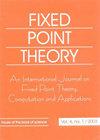Banach空间中一类拟变分包含问题和公共不动点问题的新并行算法
IF 1.1
4区 数学
Q2 MATHEMATICS
引用次数: 0
摘要
在本文中,引入并分析了一种新的并行算法,用于在q-一致Banach空间中确定拟变分包含问题组的公共解和有限族非扩张映射的公共不动点。在一定的控制条件下,建立了该算法的一个强收敛定理。因此,我们将我们的主要结果应用于求解凸最小化问题、多集变分不等式问题和多集平衡问题。文中还给出了一些图像恢复问题的数值实验来支持主要结果。本文章由计算机程序翻译,如有差异,请以英文原文为准。
A new parallel algorithm to solving a system of quasi-variational inclusion problems and common fixed point problems in Banach spaces
. In this paper, a new parallel algorithm for finding a common solution of a system of quasi-variational inclusion problems and a common fixed point of a finite family of nonexpansive mappings in a q-uniformly Banach space is introduced and analyzed. A strong convergence theorem of the proposed algorithm is established under some control conditions. As a consequence, we apply our main results to solve convex minimization problems, multiple sets variational inequality problems and multiple sets equilibrium problems. Some numerical experiments of image restoration problems are also given for supporting the main results.
求助全文
通过发布文献求助,成功后即可免费获取论文全文。
去求助
来源期刊

Fixed Point Theory
数学-数学
CiteScore
2.30
自引率
9.10%
发文量
26
审稿时长
6-12 weeks
期刊介绍:
Fixed Point Theory publishes relevant research and expository papers devoted to the all topics of fixed point theory and applications in all structured set (algebraic, metric, topological (general and algebraic), geometric (synthetic, analytic, metric, differential, topological), ...) and in category theory. Applications to ordinary differential equations, partial differential equations, functional equations, integral equations, mathematical physics, mathematical chemistry, mathematical biology, mathematical economics, mathematical finances, informatics, ..., are also welcome.
 求助内容:
求助内容: 应助结果提醒方式:
应助结果提醒方式:


